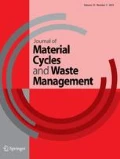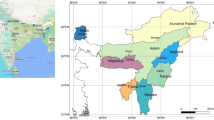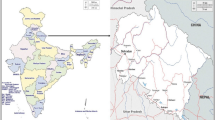Abstract
The situation of municipal solid waste (MSW) management in Pakistan and China was analyzed. In Pakistan, neither MSW collection nor disposal is effective due to the lack of institutional, administrative and financial arrangements. The MSW collection rate is about 60% and remainder 40% is leftover either in streets or vacant plots. Pakistan requires an economic and sustainable technology to achieve prompt solution for MSW collection and disposal problems in the country. Whereas, China has shown a progressive improvement in MSW management. Landfilling is a predominant and cost-effective method of MSW management in China. Also it has been revealed that MSW in China is treated by incineration. Whereas, there is neither engineered landfill nor any waste-to-energy treatment facility in Pakistan. Additionally, this study suggests a future potential investment in the waste management sector under the China Pakistan Economic Corridor project.






Similar content being viewed by others
References
Shaikh F, Ji Q, Fan Y (2016) Prospects of Pakistan–China energy and economic corridor. Renew Sustain Energy Rev 59:253–263
Ahmed S, Mahmood A, Hasan A, Sidhu GAS, Butt MFU (2016) A comparative review of China, India and Pakistan renewable energy sectors and sharing opportunities. Renew Sustain Energy Rev 57:216–225
Valasai GD, Uqaili MA, Memon HR, Samoo SR, Mirjat NH, Harijan K (2017) Overcoming electricity crisis in Pakistan: a review of sustainable electricity options. Renew Sustain Energy Rev 72:734–745
Mahar RB, Sahito AR, Yue D, Khan K (2016) Modeling and simulation of landfill gas production from pretreated MSW landfill simulator. Front Environ Sci Eng 10(1):159–167
Scaglia B, Salati S, Di Gregorio A, Carrera A, Tambone F, Adani F (2013) Short mechanical biological treatment of municipal solid waste allows landfill impact reduction saving waste energy content. Bioresour Technol 143:131–138
Gioannis GD, Muntoni A, Cappai G, Milia S (2009) Landfill gas generation after mechanical biological treatment of municipal solid waste. Estimation of gas generation rate constants. Waste Manag 29(3):1026–1034
Morris JWF, Barlaz MA (2011) A performance-based system for the long-term management of municipal waste landfills. Waste Manag 31(4):649–662
Mansour AA, Motte A, Pallier V, Feuillade-Cathalifaud G, Ponthieux A (2012) Assessment of the aerobic preparation and bottom ash addition as pretreatment steps before landfilling: impact on methanogenesis kinetics and leachate parameters. Waste Manag 32(10):1864–1872
Brandstätter C, Laner D, Fellner J (2015) Carbon pools and flows during lab-scale degradation of old landfilled waste under different oxygen and water regimes. Waste Manag 40:100–111
Aleluia J, Ferrão P (2016) Characterization of urban waste management practices in developing Asian countries: a new analytical framework based on waste characteristics and urban dimension. Waste Manag 58:415–429
National Bureau of Statistics of China. China Statistical Yearbook. China Statistics Publishing House, Beijing, China. ISBN10 7503782536, ISBN13 9787503782534. 01 Oct, 2017; 943. https://www.bookdpository.com
Ali M, Zhang J, Raga R, Lavagnolo MC, Pivato A, Wang X, Zhang Y, Cossu R, Yue D (2018) Effectiveness of aerobic pretreatment of municipal solid waste for accelerating biogas generation during simulated landfilling. Front Environ Sci Eng 12(5):231–236
Cossu R (2010) Technical evolution of landfilling. Waste Manag 30:947–948
Korai MS, Mahar RB, Uqaili MA (2017) The feasibility of municipal solid waste for energy generation and its existing management practices in Pakistan. Renew Sustain Energy Rev 72:338–353
Zuberi MJS, Ali SF (2015) Greenhouse effect reduction by recovering energy from waste landfills in Pakistan. Renew Sustain Energy Rev 44:117–131
Diaz LF (2009) Options for improving solid waste management in economically developing countries. Waste Manag 29(1):1
Marshall RE, Farahbakhsh K (2013) Systems approaches to integrated solid waste management in developing countries. Waste Manag 33(4):988–1003
Korai MS, Mahar RB, Uqaili MA (2016) Optimization of waste to energy routes through biochemical and thermochemical treatment options of municipal solid waste in Hyderabad, Pakistan. Energy Convers Manag 124:333–343
Batool SA, Chuadhry MN (2009) The impact of municipal solid waste treatment methods on greenhouse gas emissions in Lahore, Pakistan. Waste Manag 29(1):63–69
Ali SM, Pervaiz A, Afzal B, Hamid N, Yasmin A (2014) Open dumping of municipal solid waste and its hazardous impacts on soil and vegetation diversity at waste dumping sites of Islamabad city. J King Saud Univ Sci 26(1):59–65
Dincer F, Odabasi M, Muezzinoglu A (2006) Chemical characterization of odorous gases at a landfill site by gas chromatography–mass spectrometry. J Chromatogr A 1122(1–2):222–229
Safar KM, Bux MR, Aslam UM, Shankar BA, Goel RK (2018) The feasibility of putrescible components of municipal solid waste for biomethane production at Hyderabad, Pakistan. Waste Manag Res 36(2):169–182
Das B, Bhave PV, Sapkota A, Byanju RM (2018) Estimating emissions from open burning of municipal solid waste in municipalities of Nepal. Waste Manag 79:481–490
Rauf O, Wang S, Yuan P, Tan J (2015) An overview of energy status and development in Pakistan. Renew Sustain Energy Rev 48:892–931
Zakir Hossain HM, Hasna Hossain Q, Uddin Monir MM, Ahmed MT (2014) Municipal solid waste (MSW) as a source of renewable energy in Bangladesh: revisited. Renew Sustain Energy Rev 39:35–41
Komal R, Abbas F (2015) Linking financial development, economic growth and energy consumption in Pakistan. Renew Sustain Energy Rev 44:211–220
Bhutto AW, Bazmi AA, Zahedi G (2011) Greener energy: issues and challenges for Pakistan—Biomass energy prospective. Renew Sustain Energy Rev 15(6):3207–3219
Fei X, Zekkos D, Raskin L (2016) Quantification of parameters influencing methane generation due to biodegradation of municipal solid waste in landfills and laboratory experiments. Waste Manag 55:276–287
Farooq MK, Kumar S (2013) An assessment of renewable energy potential for electricity generation in Pakistan. Renew Sustain Energy Rev 20:240–254
Malatesta S et al (2015) The right place, solid waste management in the Republic of Maldives: between infrastructural measures and local practices. Misc Geogr 19(2):25–32
Guerrero LA, Ger M, William H (2013) Solid waste management challenges for cities in developing countries. Waste Manag 33:220–232
Kumar A, Samadder SR (2017) A review on technological options of waste to energy for effective management of municipal solid waste. Waste Manag 69:407–422
Yeny D, Yulinah T (2012) Solid waste management in asian developing countries: challenges and opportunities. J Appl Environ Biol Sci 2(7):329–335
Assamoi B, Lawryshyn Y (2012) The environmental comparison of landfilling vs. incineration of MSW accounting for waste diversion. Waste Manag 32(5):1019–1030
Gerassimidou S, Evangelou A, Komilis D (2013) Aerobic biological pretreatment of municipal solid waste with a high content of putrescible: effect on landfill emissions. Waste Manag Res 31:783–791
Hussain F, Chaudhry MN, Batool SA (2014) Assessment of key parameters in municipal solid waste management: a prerequisite for sustainability. Int J Sustain Dev World Ecol 21(6):519–525
Shahzad M (2013) Comparison of solid waste management between Oslo (Norway) and Lahore (Pakistan). Norwegian university of life science, Department of Noragric, Master thesis
De Clercq D, Wen Z, Fan F, Caicedo L (2016) Biomethane production potential from restaurant food waste in megacities and project level-bottlenecks: a case study in Beijing. Renew Sustain Energy Rev 59:1676–1685
Singh A, Basak P (2018) Economic and environmental evaluation of municipal solid waste management system using industrial ecology approach: evidence from India. J Clean Prod 195:10–20
Divya D, Gopinath LR, Merlin-Christy P (2015) A review on current aspects and diverse prospects for enhancing biogas production in sustainable means. Renew Sustain Energy Rev 42(Supplement C):690–699
Thi NBD, Lin C-Y, Kumar G (2016) Electricity generation comparison of food waste-based bioenergy with wind and solar powers: a mini review. Sustain Environ Res 26(5):197–202
Starr K, Villalba G, Gabarrell X (2015) Upgraded biogas from municipal solid waste for natural gas substitution and CO2 reduction—a case study of Austria, Italy, and Spain. Waste Manag 38:105–116
National Bureau of Statistics of China (2017) China statistical yearbook. National Bureau of Statistics of China, Beijing
Zeng C, Niu D, Zhao Y (2015) A comprehensive overview of rural solid waste management in China. Front Environ Sci Eng 9(6):949–961
Chen X, Geng Y, Fujita T (2010) An overview of municipal solid waste management in China. Waste Manag 30(4):716–724
Ali M, Zhang J, Raga R, Lavagnolo MC, Pivato A, Wang X, Zhang Y, Cossu R, Yue D (2018) Effectiveness of aerobic pretreatment of municipal solid waste for accelerating biogas generation during simulated landfilling. Front Environ Sci Eng 12(3):5
Zhang Y, Yue D, Liu J, Lu P, Wang Y, Liu J, Nie Y (2012) Release of non-methane organic compounds during simulated landfilling of aerobically pretreated municipal solid waste. J Environ Manag 101:54–58
Li R, Yue D, Liu J, Nie Y (2009) Size fractionation of organic matter and heavy metals in raw and treated leachate. Waste Manag 29(9):2527–2533
Fei F, Wen Z, Huang S, De Clercq D (2018) Mechanical biological treatment of municipal solid waste: energy efficiency, environmental impact and economic feasibility analysis. J Clean Prod 178:731–739
Wang Y, Yan Y, Chen G, Zuo J, Du H (2015) Effective approaches to reduce greenhouse gas emissions from waste to energy process: a China study. Resour Conserv Recycl 104(Part A):103–108
Yue D, Han B, Sun Y, Yang T (2014) Sulfide emissions from different areas of a municipal solid waste landfill in China. Waste Manag 34(6):1041–1044
Xu Q, Jin X, Ma Z, Tao H, Ko JH (2014) Methane production in simulated hybrid bioreactor landfill. Biores Technol 168:92–96
Zhou H, Meng A, Long Y, Li Q, Zhang Y (2014) An overview of characteristics of municipal solid waste fuel in China: physical, chemical composition and heating value. Renew Sustain Energy Rev 36:107–122
Liu T, Chen Z, Zhang J, Xiong H, Cheng X. Study of a short-term biological pretreatment of MSW with low aeration. In: The 4th international conference on bioinformatics and biomedical engineering; 2010
Nie Y (2010) The technology and policy of urban solid waste disposal in China. Int J Environ Stud 67(2):183–193
World Bank. Waste management in China—issues and recommendations. The World Bank, working paper No. 9 (2005); 2005
Nie Y (2008) Development and prospects of municipal solid waste (MSW) incineration in China. Front Environ Sci Eng China 2(1):1–7
Author information
Authors and Affiliations
Corresponding author
Additional information
Publisher's Note
Springer Nature remains neutral with regard to jurisdictional claims in published maps and institutional affiliations.
Rights and permissions
About this article
Cite this article
Korai, M.S., Ali, M., Lei, C. et al. Comparison of MSW management practices in Pakistan and China. J Mater Cycles Waste Manag 22, 443–453 (2020). https://doi.org/10.1007/s10163-019-00951-0
Received:
Accepted:
Published:
Issue Date:
DOI: https://doi.org/10.1007/s10163-019-00951-0




